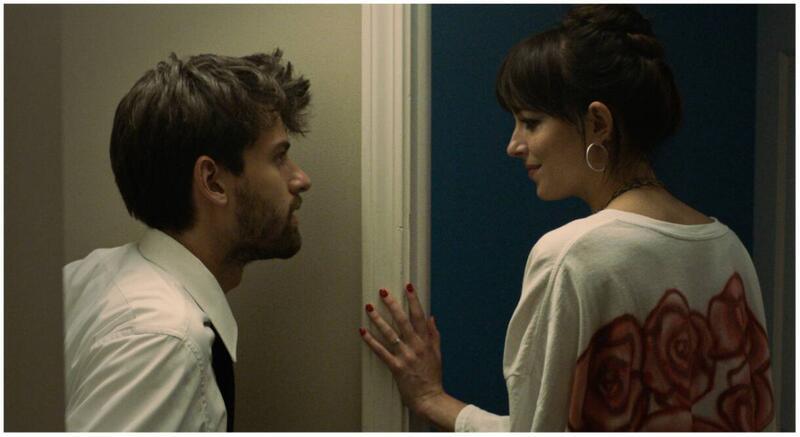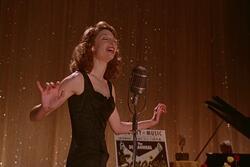'Cha Cha Real Smooth' Has a Toxically Passive Leading Man
Cha Cha Real Smooth, Apple TV+’s new coming-of-age story about a recent college grad who works as a bar mitzvah party-starter while falling in love with an older woman, was not for me. That’s OK! But as a person who came of age getting and throwing out a pair of those unusable Kanye West shutter shades at every bar or bat mitzvah for fifteen weeks straight in seventh grade—the same ones that are prominently featured in one of the first shots of this film—it probably should have been.
Writer/director/producer/star Cooper Raiff has been hailed as the Zillennial answer to director Richard Linklater, and I’d like to push back on that. Like Cha Cha Real Smooth, Linklater’s films, including the Before trilogy, are dialogue- and character-driven, deeply personal, and pack an often-surprising emotional punch. But where Linklater pays painstaking attention to environmental realism, Raiff’s sophomore outing feels more like a transparent effort to put himself on the Hollywood map. Cha Cha Real Smooth sacrifices truth for names and introspection for self-bolstering. It would have been much more successful if Raiff hadn’t made himself the main character, turning himself into the story in a film that needed a bit more distance to find balance.
Dakota Johnson and Leslie Mann are woefully misused as Raiff’s love interest and mother, respectively. Both are wonderful actors when employed correctly (especially Johnson), but here their performances are stymied by Raiff’s shallow control of the narrative. It felt like he assumed it was enough to hitch to his wagon heavyweight performers and members of Hollywood dynasties (Mann is married to Judd Apatow and appears in all of his movies; Johnson’s parents are Don Johnson and Melanie Griffith, and her grandmother is Tippi Hedren, best known for starring in Alfred Hitchcock’s The Birds)—but even the best actors need to be competently directed.
Johnson and Mann are too famous and glamorous to be legible as nebulously mentally ill, divorced, local New Jerseyites without that competent direction. That those descriptors could be applied to both characters interchangeably is also a failure of writing and of imagination. Where Cha Cha Real Smooth succeeds at illuminating some of the emotional depth of its male characters, its women are underwritten and under-explored. I had to walk away from my TV when Domino (Johnson) tried to have sex with Andrew (Raiff) minutes after cleaning herself up from a miscarriage—people are complicated, sure, but I think it’s gross to suggest that this man, who did the bare minimum to help Domino with her emergency, has become sexually irresistible to her in the aftermath. But, clearly, this is not Domino’s story.
The only female character with any suggestion of an inner life is Domino’s daughter, Lola, played adeptly by Vanessa Burghardt in her debut performance. Andrew connects with her as her babysitter and not as a son or lover, so he’s able to see her personhood more clearly. The problem is, Lola isn’t written well. She is wooden and helpless, and she speaks robotically, never using contractions. It’s almost like Raiff wanted to include an autistic character but didn’t want to do the work to understand autism, teenage girls, or the entirely platonic and non-familial connection between his character and hers. We do not see Andrew earn her trust in the way we needed to justify the trajectory of their bond.
What this film wants us to know is that Andrew is a really great guy. If we didn’t already think so because of how amazing he is with kids and single moms, we hear it from pretty much every other character. Domino tells him she feels comfortable around him, but she doesn’t know why; women discuss how adorable and easy he is to talk to; he gets offered jobs and immediate connections with every woman he pursues. His consolation prize after Domino rejects him is a sexual relationship with the girl from high school that “everyone” had a crush on. His only contentious relationships are with his stepfather, for some undisclosed reason, and with bar mitzvah-aged kids who are demonstrably huge jerks. He’s a Mary Sue—a character with no flaws, an idealized version of who Cooper Raiff wants us to think he really is.
I wanted Andrew to be a bigger stakeholder in his own story. Instead, he’s toxically passive, letting things and people happen to him on the grace of his unthreatening charm. But that’s such a low bar for greatness. I have no empathy for a character who is implicitly adored by every single person he meets, simply because he is conventionally attractive and charming and not the bad kind of masculine. No one holds him accountable and no one can stay mad at him.
He does mess up, and he does (immediately, and without us seeing exactly why) apologize for making mistakes—but only to his family members. Cha Cha Real Smooth is almost a movie about someone self-actualizing and realizing that their thoughts and feelings really matter to the people around them, but it falls short in dealing with matters of the heart. Domino’s fiancé even thanks him for looking out for their family—immediately after Andrew shows up to try to break up that very family.
Andrew only realizes his actions have consequences when he’s cruel to his younger brother simply because he’s in a bad mood; the shot of David (the very good Evan Assante) lying down in bed with big, frightened eyes, reacting to Andrew calling him annoying, was very evocative. It’s deeply upsetting when somebody you idolize talks down to you, and this was the only moment of the movie that made me feel like a character had internalized some pain. If I had to guess, I would say that’s because Raiff was finally writing and directing with emotional honesty about what he knows, instead of trying to make himself look good. I wish the whole movie was that self-aware; the gut-punches would be less navel gaze-y.
Cha Cha Real Smooth has good bones, but it could have been much more powerful with some narrative distance and collaboration. Instead, it’s a flawed portrait of a nearly flawless main character. He is not interesting, and neither are the hasty caricatures of troubled women who propel his maybe-transformation.








Agreed. everything about Cooper Raiff is unlikeable.